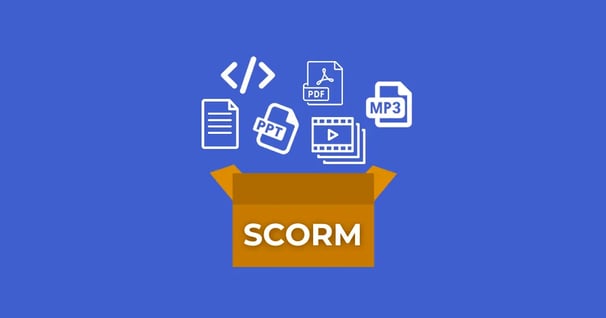Overview - Understanding SCORM and xAPI
KnowledgeCity's courses plug seamlessly into other Learning Management Systems through SCORM or xAPI
Understanding SCORM and xAPI: Enhancing Learning Management Systems with KnowledgeCity
In modern digital learning ecosystems, standardized content frameworks are essential for ensuring consistency, interoperability, and measurable learning outcomes. Two globally recognized eLearning standards SCORM and xAPI (Tin Can API) form the foundation of how learning content is delivered, tracked, and reported across Learning Management Systems (LMS).
KnowledgeCity fully supports these standards by providing its course library in SCORM (1.2 and 2004) and xAPI (Tin Can) formats. This enables organizations to seamlessly deploy KnowledgeCity content within third-party LMS platforms, as well as integrate externally developed SCORM content into the KnowledgeCity LMS.
What is SCORM?
SCORM (Sharable Content Object Reference Model) is a set of technical specifications designed to standardize how eLearning content communicates with an LMS. It ensures that learning content can be launched, tracked, and reported consistently across compliant platforms.
Key Features of SCORM:
-
Interoperability
SCORM-compliant courses can be deployed across different LMS platforms without modification, provided the platforms are SCORM-compliant. -
Reusability
Learning content can be reused across multiple courses and LMS environments, reducing duplication and development effort. -
Accessibility
SCORM content can be accessed through any compatible LMS, supporting centralized learner management. -
Trackability
The standard enables reliable tracking of learner activity, including completion status, assessment results, time spent, and interaction data.
KnowledgeCity provides course packages in the following industry-standard formats:
- SCORM 1.2
- SCORM 2004
- xAPI (Tin Can)
These formats ensure broad compatibility with enterprise and commercial LMS platforms.
Bringing KnowledgeCity Courses to Your LMS
KnowledgeCity's course offerings are compatible with a range of LMS platforms that meet SCORM and xAPI specifications. This means you can conveniently upload our SCORM files or TinCan packages into your chosen LMS, allowing your learners to benefit from KnowledgeCity’s high-quality and diverse course library.
Integration Process
- Download the course package files provided by KnowledgeCity. (These files are provided as .zip packages)
- Upload the package to your LMS using your platform’s course import functionality.
- Assign the course to learners and monitor progress through your LMS reporting tools.

An example course opened in the SCORM Cloud desktop platform. It is a useful tool powered by Rustici Software and commonly used for testing playback of SCORM files.
Bringing Your SCORM Courses to KnowledgeCity
KnowledgeCity’s LMS is designed to be flexible and extensible. In addition to hosting KnowledgeCity-authored courses, administrators can upload externally developed SCORM compliant courses into the platform to create custom training experiences. This capability allows organizations to consolidate proprietary training materials and third-party content into a single learning environment.
Uploading SCORM Content to KnowledgeCity's LMS
An example illustration of a SCORM file uploaded into a course lesson.
LMS administrators can leverage the robust functionality of KnowledgeCity's platform by uploading SCORM packages to create and publish new courses. This process not only enriches the learning catalog available to your users but also streamlines the content management process.
Step-by-Step Instructions
-
Access the Courses Feature of the LMS: Log in to your LMS admin dashboard and navigate to the "Courses" page on the left side-bar.
-
Create a New Lesson-Type Course: Select the option to create a new Lesson type course.
- Create Your Course Chapters and Lessons: A Lesson type course will include at least one chapter with one lesson. Select the lesson(s) that will serve as your SCORM lesson(s).
-
Upload the SCORM File: Choose the SCORM file you wish to upload from your computer. The KnowledgeCity LMS supports SCORM 1.2 and SCORM 2004 file formats, ensuring compatibility and ease of integration.
-
Configure Lesson Settings: Assign a title, description, and set the necessary parameters for the lesson, such as completion criteria and availability. From Launch mode dropdown of the selected lesson, you can also toggle the SCORM content to be launched in a Separate window or to be viewed Inline, within the content frame of the course page.
-
Publish the Course: Once the SCORM file is uploaded, and all content and settings are appropriately configured, you can save all changes and publish the lesson. It will then become available to learners as part of your course offerings.
For additional information on creating Lesson type courses supporting your own SCORM content, be sure to check our supplemental article on this topic.
Conclusion
Whether you're a seasoned eLearning professional or new to LMS platforms, understanding the importance of SCORM and xAPI is essential for managing and leveraging online learning content effectively. Our support for these standards ensures that our high-quality educational content enhances the learning journey across various environments, providing a dynamic and adaptable learning experience for every user.

